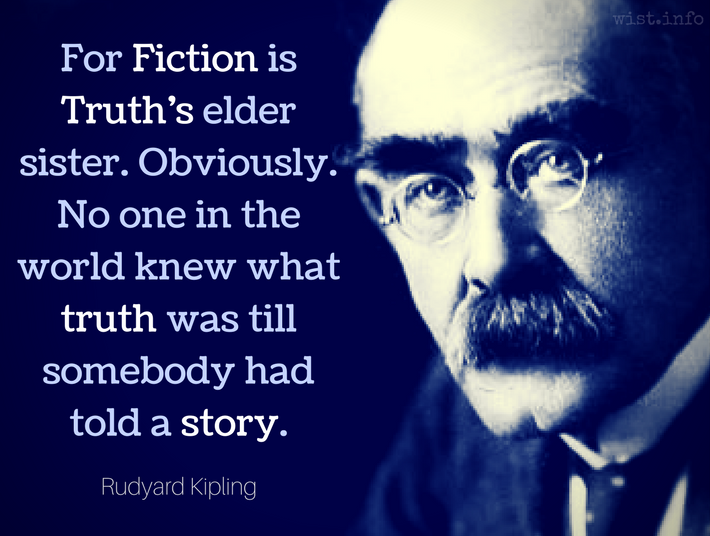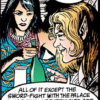Clean, quick, and easy as lying. We know how it ends practically before it starts. That’s why stories appeal to us. They give us the clarity and simplicity our real lives lack.
Patrick Rothfuss (b. 1973) American author
The Name of the Wind, ch. 45 “Interlude — Some Tavern Tale” [Kvothe] (2007)
(Source)
Quotations about:
story-telling
Note not all quotations have been tagged, so Search may find additional quotes on this topic.
Fantasy is my favorite genre for reading and writing. We have more options than anyone else, and the best props and special effects. That means if you want to write a fantasy story with Norse gods, sentient robots, and telepathic dinosaurs, you can do just that. Want to throw in a vampire and a lesbian unicorn while you’re at it? Go ahead. Nothing’s off limits. But the endless possibility of the genre is a trap. It’s easy to get distracted by the glittering props available to you and forget what you’re supposed to be doing: telling a good story. Don’t get me wrong, magic is cool. But a nervous mother singing to her child at night while something moves quietly through the dark outside her house? That’s a story. Handled properly, it’s more dramatic than any apocalypse or goblin army could ever be.
Patrick Rothfuss (b. 1973) American author
“Exploring the Edge of the Fantasy Map,” interview by Paul Goat Allen, Publisher’s Weekly (31 Jan 2011)
(Source)
Stories may well be lies, but they are good lies that say true things, and which can sometimes pay the rent.
Neil Gaiman (b. 1960) British author, screenwriter, fabulist
“Politics, Portugal and No Gumbo-Limbo Trees,” blog entry (17 Nov 2004)
(Source)
If then my fortunes can delight my friend,
A story fruitful of events attend:
Another’s sorrow may thy ears enjoy,
And wine the lengthen’d intervals employ.
Long nights the now declining year bestows;
A part we consecrate to soft repose,
A part in pleasing talk we entertain;
For too much rest itself becomes a pain.[ξεῖν᾽, ἐπεὶ ἂρ δὴ ταῦτά μ᾽ ἀνείρεαι ἠδὲ μεταλλᾷς,
σιγῇ νῦν ξυνίει καὶ τέρπεο, πῖνέ τε οἶνον
ἥμενος. αἵδε δὲ νύκτες ἀθέσφατοι: ἔστι μὲν εὕδειν,
ἔστι δὲ τερπομένοισιν ἀκούειν: οὐδέ τί σε χρή,
πρὶν ὥρη, καταλέχθαι: ἀνίη καὶ πολὺς ὕπνος.]Homer (fl. 7th-8th C. BC) Greek author
The Odyssey [Ὀδύσσεια], Book 15, l. 390ff (15.390) [Eumæus] (c. 700 BC) [tr. Pope (1725)]
(Source)
(Source (Greek)). Alternate translations:
Since thou enquir’st of that, my guest, said he,
Hear and be silent, and, mean space, sit free
In use of these cups to thy most delights;
Unspeakable in length now are the nights.
Those that affect sleep yet, to sleep have leave,
Those that affect to hear, their hearers give.
But sleep not ere your hour; much sleep doth grieve.
[tr. Chapman (1616)]
Since to hear the story
Of how I hither came it is your pleasure,
Sit patiently, the wine there stands before ye;
For sleep and joy the long nights give us leisure,
It is not good too soon to go to bed;
For too much sleep is but a weariness.
[tr. Hobbes (1675), l. 349ff]
Stranger! since thou art curious to be told
My story, silent listen, and thy wine
At leisure quaff. The nights are longest now,
And such as time for sleep afford, and time
For pleasant conf’rence; neither were it good
That thou should’st to thy couch before thy hour,
Since even sleep is hurtful, in excess.
[tr. Cowper (1792)]
Since of these things thou askest, O my friend.
Sit here at ease delighted and drink wine,
And silently on this my tale attend.
For now the nights move slowly and scarce end;
Yeah, there is room for slumber, and to keep
Watch, and a listening ear to sweet words lend.
Needs not at all unto thy couch to creep
For some while yet. Harm comes from even too much sleep.
[tr. Worsley (1861), st. 54]
Stranger! since thus thou questionest, and fain
So much from me would'st learn, remain thou mute,
And, thy seat here maintaining, take thine ease
And drink that wine: The nights are lengthsome, now,
And we to slumber may betake ourselves,
As we may equally with raptur'd ears
To some recital listen. 'Tis not well
That thou before thy wonted hour the couch
Of rest should'st seek: for, slumber in excess
A hurt becomes.
[tr. Musgrave (1869), l. 638ff]
Sir guest! since you thus ask and question me,
List to me now, and take your pleasure sitting
There at the wine: the nights are long; there's time
For sleep; and listening with delight to tales!
No need to lay thee down before the time;
And too much sleeping is a mere annoyance.
[tr. Bigge-Wither (1869), l. 389ff]
Stranger, since thou askest and questionest me hereof, give heed now in silence and make merry, and abide here drinking wine. Lo, the nights now are of length untold. Time is there to sleep, and time to listen and be glad; thou needest not turn to bed before the hour; even too much sleep is vexation of spirit.
[tr. Butcher/Lang (1879)]
O guest, since of these matters thou askest and seekest of me,
Sit on and drink and be merry, and hush thy voice, and heed:
For measureless long is the night-tide, and time is for sleep indeed,
And time too for the merry hearkening; nor before the hour is come
Is need to wend us bedward; and much sleep is wearisome.
[tr. Morris (1887), l. 390ff]
Stranger, since now you ask of this and question me, quietly listen; take your ease, and sit and drink your wine. These nights are vastly long. there is time enough to sleep, and time to cheer ourselves with hearing stories. You must not go to bed till bed-time; too much sleeping harms.
[tr. Palmer (1891)]
Stranger, replied Eumæus, as regards your question. Sit still, make yourself comfortable, drink your wine, and listen to me. The nights are now at their longest; there is plenty of time both for sleeping and sitting up talking together; you ought not to go to bed till bed time, too much sleep is as bad as too little.
[tr. Butler (1898), l. 389ff]
Stranger, replied Eumaios, the swineherd and leader of men, as regards your question: sit still, make yourself comfortable, drink your wine, and listen to me. The nights are now at their longest; there is plenty of time both for sleeping and sitting up talking together; you ought not to go to bed till it is time [hōrā], too much sleep is as bad as too little.
[tr. Butler (1898), rev. Kim/McCray/Nagy/Power (2018), ll. 390-95]
Stranger, since thou dost ask and question me of this, hearken now in silence, and take thy joy, and drink thy wine, as thou sittest here. These nights are wondrous long. There is time for sleep, and there is time to take joy in hearing tales; thou needest not lay thee down till it be time; there is weariness even in too much sleep.
[tr. Murray (1919), ll. 390-94]
Stranger, if you will open up that topic, settle yourself comfortably into your seat, refill your cup and listen to me closely. These nights are inordinately long and afford us time for diverting tales and for sleep too. Nor is there point in sleeping over soon: that way lies boredom.
[tr. Lawrence (1932)]
My friend, replied the admirable swineherd, you have asked for the story of my capture. Very well, give me your ear and enjoy the tale as you sit there and drink your wine. There’s no end to these nights. They give one time to listen and be entertained as well as time to sleep. Nor is there any need for you to go early to bed. Even where sleep is concerned, too much is a bad thing.
[tr. Rieu (1946)]
Friend, now that you shown an interest in that matter, attend me quietly, be at your ease, and drink your wine. These autumn nights are long, ample for story-telling and sleep. You need not go to bed before the hour; sleeping from dusk to dawn's a dull affair.
[tr. Fitzgerald (1961)]
My guest, since indeed you are asking me all these questions,
listen in silence and take your pleasure, and sit there drinking
your wine. These nights are endless, and a man can sleep through them.
or he can enjoy listening to stories, and you have no need
to go to bed before it is time. Too much sleep is only
a bore.
[tr. Lattimore (1965)]
Stranger, since you insist on asking this. Be silent as I tell my tale, just sip your wine and sit at ease. These are long nights: there's time for sleep and time to take delight in listening to tales; it is not right to shut one's eyes too early: there's fatigue even in too much sleep.
[tr. Mandelbaum (1990)]
My friend, the swineherd answered, foreman of men,
you really want my story? So many questions -- well,
listen in quiet, then, and take your ease, sit back
and drink your wine. The nights are endless now.
We've plenty of time to sleep or savor a long tale.
No need, you know, to turn in before the hour.
Even too much sleep can be a bore.
[tr. Fagles (1996)]
My friend, you have asked for my story. Very well, listen quietly and enjoy the tale as you sit there and drink your wine. These nights are very long. They give one time to listen and be entertained as well as time to sleep. Nor is there any need for you to go early to bed. Too much sleep is a bad thing.
[tr. DCH Rieu (2002)]
Guest, you ask the question and seek to know all about this; so now be silent, listen and enjoy the tale, as you sit there and drink your wine. The nights are now very long; there is time enough to sleep, and to enjoy hearing a story. You do not need to go to bed before time; and too much sleep does you no good.
[tr. Verity (2016)]
Since you have asked this question, stranger, listen; enjoy my store, sitting quietly, drinking your wine. These nights are magical, with time enough to sleep and to enjoy hearing a tale. You need not sleep too early; it is unhealthy.
[tr. Wilson (2017)]
Stranger, since you're questioning me about these matters, listen in silence now, at your ease, and drink your wine while you sit here. These nights are endless: you can sleep, you can also listen for pleasure. No need to bed down before the time comes.
[tr. Green (2018)]
Stranger, since you ask questions about this,
stay quiet, enjoy yourself, drink your wine,
as you sit there, and listen to my tale.
These nights go on forever. There’s a time
to sleep, and there’s a time to take delight
in hearing stories. You don’t need to rest
before you’re ready, and excessive sleep
can leave one weary.
[tr. Johnston (2019), l. 498ff]
I have no stomach to repeat a long story that has already been plainly told.
[Ἐχθρὸν δέ μοί ἐστιν
αὖτις ἀριζήλως εἰρημένα μυθολογεύειν.]Homer (fl. 7th-8th C. BC) Greek author
The Odyssey [Ὀδύσσεια], Book 12, l. 453ff (12.453) [Odysseus] (c. 700 BC) [tr. Verity (2016)]
(Source)
Original Greek. Alternate translations:
And, for me to grow
A talker-over of my tale again,
Were past my free contentment to sustain.
[tr. Chapman (1616)]
Nor do I love the same tale twice to tell.
[tr. Hobbes (1675)]
Enough: in misery can words avail?
And what so tedious as a twice-told tale?
[tr. Pope (1725)]
I told it yesterday, and hate a tale
Once amply told, then, needless, traced again.
[tr. Cowper (1792), ll. 530-31]
The wordy tale, once told, were hard to tell again.
[tr. Worsley (1861), st. 61]
Distasteful is it to me -- aye again
To harp on tales already clearly told!
[tr. Bigge-Wither (1869)]
It liketh me not twice to tell a plain-told tale.
[tr. Butcher/Lang (1879)]
And irksome 'tis to me
To tell again of matters that told out clearly be.
[tr. Morris (1887)]
And it is irksome to tell a plain-told tale a second time.
[tr. Palmer (1891)]
I hate saying the same thing over and over again.
[tr. Butler (1898)]
And it is hateful [ekhthron] for me to say the same thing over and over again.
[tr. Butler (1898), rev. Power/Nagy]
It is an irksome thing, meseems, to tell again a plain-told tale.
[tr. Murray (1919)]
It goes against my grain to repeat a tale already plainly told.
[tr. Lawrence (1932)]
It goes against the grain with me to repeat a tale already plainly told
[tr. Rieu (1946)]
Those adventures made a long evening, and I do not hold with tiresome repetition of a story.
[tr. Fitzgerald (1961)]
It is hateful to me
to tell a story over again, when it has been well told.
[tr. Lattimore (1965)]
I do not hold with telling over what has been well told.
[tr. Mandelbaum (1990)]
It goes against my grain to repeat a tale told once, and told so clearly.
[tr. Fagles (1996)]
To me it is hateful telling again some tale that has once been told to perfection.
[tr. Merrill (2002)]
It is tedious for me to repeat a tale already plainly told.
[tr. DCH Rieu (2002)]
It is annoying, repeating tales that have been told before.
[tr. Wilson (2017)]
I really dislike repeating a tale that's been clearly narrated on a previous occasion.
[tr. Green (2018)]
And it’s an irritating thing, I think,
to re-tell a story once it’s clearly told.
[tr. Johnston (2019)]
The whole truth would be an infinite concatenation of mostly irrelevant facts, with an occasional dose of, in textspeak, “TMI,” too much information — when, for example, you ruin the case you were making against factory farming by going into such detail about how painful de-beaking is for chickens that your listener shuts you out and struggles to think about something else. So we do not tell the whole truth; we tell carefully crafted stories, and we do this even when our moral purpose is to tell the truth.
Justin E. H. Smith (b. 1972) American-Canadian professor of history and philosophy of science
Irrationality: A History of the Dark Side of Reason, ch. 8 (2019)
(Source)
It should be quite unnecessary to point the moral; the right telling of the story should be sufficient. Do not moralize, but let the facts produce their own moral in the child’s mind.
Bertrand Russell (1872-1970) English mathematician and philosopher
Education and the Good Life, ch. 11 (1926)
(Source)
You unlock this door with the key of imagination. Beyond it is another dimension: a dimension of sound, a dimension of sight, a dimension of mind. You’re moving into a land of both shadow and substance, of things and ideas. You’ve just crossed over into — the Twilight Zone.
Rod Serling (1924-1975) American screenwriter, playwright, television producer, narrator
Twilight Zone, Introduction, Seasons 4-5 (1963-1964)
(Source)
JOYCE: An artist is the magician put among men to gratify — capriciously — their urge for immortality. The temples are built and brought down around him, continuously and contiguously, from Troy to the fields of Flanders. If there is any meaning in any of it, it is in what survives as art, yes even in the celebration of tyrants, yes even in the celebration of nonentities. What now of the Trojan War if it had been passed over by the artist’s touch? Dust. A forgotten expedition prompted by Greek merchants looking for new markets. A minor redistribution of broken pots. But it is we who stand enriched, by a tale of heroes, of a golden apple, a wooden horse, a face that launched a thousand ships —– and above all, of Ulysses, the wanderer, the most human, the most complete of all heroes — husband, father, son, lover, farmer, soldier, pacifist, politician, inventor and adventurer.
The Muse was suddenly there for Dad.
The Truth lay easy in his mind.
The Subconscious lay saying its say, untouched, and flowing off his tongue.
As we must learn to do in our writing.
As we can learn from every man or woman or child around us when, touched and moved, they tell of something they loved or hated this day, yesterday, or some other day long past. At a given moment, the fuse, after sputtering wetly, flares and the fireworks begin.
Oh, it’s limping crude hard work for many, with language in their way. But I have heard farmers tell about their very first wheat crop on their first farm after moving from another state, and if it wasn’t Robert Frost talking, it was his cousin, five times removed. I have heard locomotive engineers talk about America in the tones of Thomas Wolfe who rode our country with his style as they ride it in their steel. I have heard mothers tell of the long night with their firstborn when they were afraid that they and the baby might die. And I have heard my grandmother speak of her first ball when she was seventeen. And they were all, when their souls grew warm, poets.Ray Bradbury (1920-2012) American writer, futurist, fabulist
“How to Keep and Feed a Muse,” The Writer (1961-07)
(Source)
Reprinted in Bradbury, Zen in the Art of Writing (1990).
INNKEEPER: Was that the truth, Cluracan?
CLURACAN: All of it except the sword-fight with the palace guard, which I threw in to add verisimilitude, excitement, and local color to an otherwise bald and insipid narrative.
Neil Gaiman (b. 1960) British author, screenwriter, fabulist
Sandman, Book 8. World’s End, # 52 “Cluracan’s Tale” (1993-08)
(Source)














